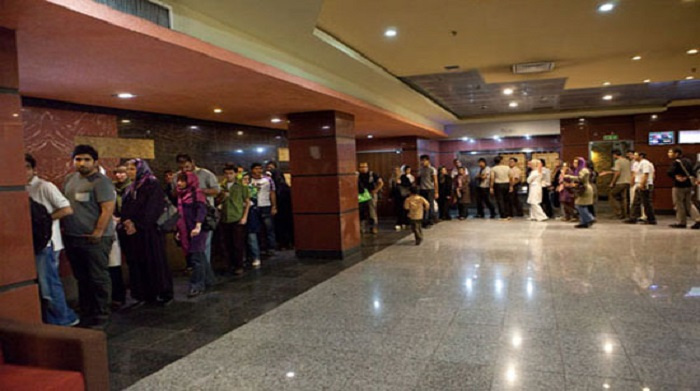Box Office Breaks Records As Iranians Feel Better

The Iranian New Year, Nowruz, saw a great boost in box office sales, with feature films breaking records and getting extra show times, revigorating the whole industry after years of stagnation. Moviegoers stood in long lines to get their tickets while late-comers had to wait for the 5:00 a.m. show times. The Nowruz box office raised the bar to more than 16 billion tomans (US $5.2 m) whereas movies had sold 3.2 billion tomans (little more than a million dollars) in the same period last year. The jump comes after a 20 percent hike in ticket prices, generally considered a potential detriment to sales.
The first month of the Persian calendar year has also had its own records. The box office was four times larger than that of the previous year, with a sum of 26.7 billion tomans (US $8.8 m), and more than 3.8 million viewers, as director of Filmiran, Ali Sartipi, told ISNA.Ticket prices in Iran are three times cheaper than in most countries, with the premium theaters selling at rates roughly equal to $3.
As an article published in Etemad daily on April 10 implies, many experts believe the Guild Screening Council’s handpicked list that covered a variety of tastes was the main reason behind the warm public reception. While critics say the higher quality of the films, including Saeed Roustaei’s Farhadi-esque debut, Life without Parole, and Mani Haghighi’s genre-defying mockumentary, Enter the Dragon, has spiced things up, a look at the charts suggests otherwise.
At the top of the charts published by Cinema Ticket, last updated on April 28, stands I Am Not Salvador with more than 12.55 billion tomans followed by Mani Haghighi’s star-filled comedy, Fifty Kilos of Sour Cherries (8.35 b), Life without Parole (5.7 b) and Hatamikia’s Bodyguard which follows closely at 5.44 b.
Both I Am Not Salvador and Fifty Kilos of Sour Cherries have been criticized to be slapsticks lacking content, according to Etemad’s casual field survey of online comments. Reza Saeedipour, the director of Azadi cinema complex, says the public reception comes mainly because of the good arrangement of the screening list during the holidays as well as the freedom to air trailers from satellite channels, officially forbidden but popularly watched in Iran. “This year, the [state] TV had no good series among its programs as it did in previous years and fell behind, so the people chose to go to the cinemas instead,” he told ISNA.
“This year, our cinema used an extraordinary and unintentional publicity by our colleagues,” Producer Gholamreza Moussavizadeh told a roundtable held by Etemad last Monday. “A decision was made to premiere most feature films screened abroad, in Australia, Canada, the United States and Germany. Foreign distributors used satellite TVs to advertise the films which contributed to the domestic sales. In fact, even though the Iranian cineastes and producers had no direct role in satellite advertisement, the trailers aired did their jobs,” he said.
In the roundtable, Sartipi noted that the rush was not limited to the capital and its good news. He said a theater in Shiraz had sold about 18 million tickets.
“I think the main thing is the people themselves. Consider the two successive years before. In 1392 (ending on March 20, 2014), we sold 33 billion (in tomans) and last year we reached 75 billion. I mean the reception had started a year ago and the films are the main reason,” he said, while itemizing modern complexes, a more open advertising atmosphere, the state TV’s decline and digital technology at the top of other reasons.
The whole story reminds us of Hollywood’s rise to prosperity during the 1930’s Great Depression. While beware of the inevitable analogies, famous Iranian female filmmaker Manijeh Hekmat agrees with Ali Sartipi that people are feeling better. “They begin social and familial moves because they have assurances. We can see the same surge in the number of people going to bookstores, art galleries and museum … such social moves result from economic stability rather than insecurity,” she said, while elsewhere in her remarks she called the feeling a result of the nuclear deal and the recent parliamentary election.
Fereydoun Jeyrani, an influential film director, screenwriter, and TV presenter, concludes the debate with an illustrative pattern of socioeconomic change in post-revolutionary Iran. He says there have been three historical periods having great impacts on the country’s film industry. Hope for socioeconomic change emerging at the onset of Hashemi Rafsanjani, Mohammad Khatami and Hassan Rouhani’s presidencies has significantly contributed to the box office. The demise of such hopes during the first two’s tenures brought parallel declines in sales, Jeyrani noted.
The Rouhani administration, aptly campaigned as the juxtaposition of “hope and prudence”, has seen its predecessors’ compromises over inspirational achievements in directing the country’s arts and culture and declined to make deals for political gains so that it can keep the lights on for posterity. Let’s hope it can hold on in the relay race before handing the torch over.

